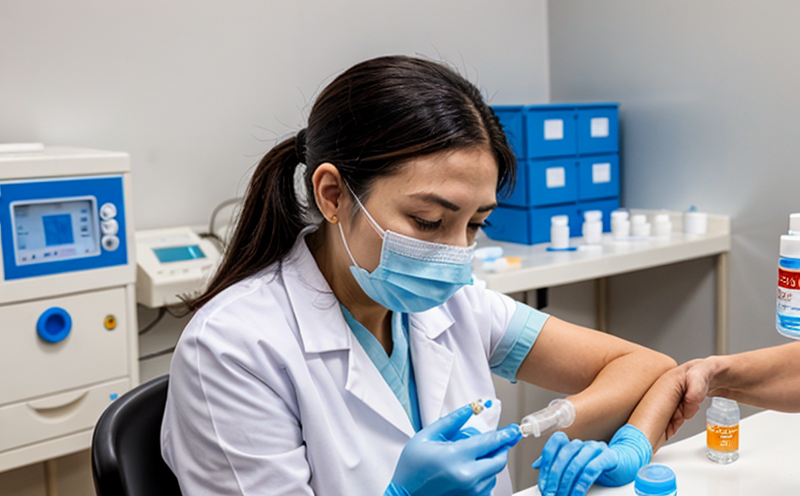WHO Thermal Stability Testing of Vaccines
The World Health Organization (WHO) thermal stability testing is a critical component in ensuring the safety and efficacy of vaccines. This service involves a series of rigorous tests designed to evaluate how vaccines behave under different temperatures, which are essential for understanding their shelf life and storage conditions during distribution.
Vaccines must maintain their potency and effectiveness throughout the supply chain from manufacturing facilities to remote healthcare settings. WHO thermal stability testing plays a vital role in determining the optimal temperature range within which vaccines can be safely stored without losing their immunological properties. This is particularly important for developing countries with less stable infrastructure, where maintaining cold chains may pose challenges.
The process typically begins by selecting a representative sample of vaccine batches produced under standard conditions. Each batch undergoes a series of stress tests using various temperature profiles to simulate real-world storage and transportation scenarios. These profiles can range from extreme heat up to -20°C down to 40°C, depending on the specific requirements outlined in international standards such as WHO guidelines.
After exposure to these conditions, samples are analyzed for changes in physical properties like viscosity or color, chemical stability through spectroscopy techniques, and functional integrity via biological assays. The goal is to identify any degradation that could compromise vaccine efficacy when administered at lower temperatures during routine use.
Accurate interpretation of results requires experienced analysts familiar with both pharmaceutical science principles and regulatory expectations set forth by organizations like WHO. They ensure compliance not only with local laws but also international best practices, helping manufacturers meet global standards for quality assurance.
In summary, WHO thermal stability testing ensures that vaccines remain effective despite potential variations in storage temperature during transport or use. By providing reliable data on shelf life and optimal handling procedures, this service supports public health initiatives aimed at expanding access to immunizations worldwide.
Quality and Reliability Assurance
Thermal stability testing is an integral part of the overall quality assurance process for vaccines. It guarantees that each batch meets stringent criteria established by regulatory bodies including WHO, FDA (Food and Drug Administration), EMA (European Medicines Agency), etc.
- Data Integrity: Ensures all collected data accurately reflects actual test conditions to provide reliable insights into vaccine performance.
- Repeatable Experiments: Standard operating procedures ensure consistent results across multiple batches, enhancing reproducibility and trustworthiness of findings.
- Cross-Validation: Comparisons with historical data help verify consistency over time, reinforcing confidence in the stability assessment process.
The robustness of these tests contributes significantly to maintaining high standards throughout the pharmaceutical industry. By adhering strictly to protocols and utilizing state-of-the-art equipment, laboratories can deliver accurate assessments that meet stringent regulatory requirements.
Environmental and Sustainability Contributions
The environmental impact of vaccine production and distribution is a growing concern within the healthcare sector. Ensuring proper thermal stability contributes positively towards sustainability efforts by minimizing waste associated with ineffective or expired vaccines.
Accurate thermal stability testing allows manufacturers to optimize storage conditions, thereby reducing the need for excessive refrigeration during transportation and storage. This not only lowers operational costs but also helps reduce carbon footprints linked to energy consumption in cold chain logistics.
Better understanding of temperature tolerances enables more efficient use of resources without compromising safety or efficacy. For instance, vaccines that can tolerate higher temperatures might be stored closer to the end-user, reducing reliance on expensive refrigeration units. This approach supports global health goals while promoting responsible resource management practices.
Competitive Advantage and Market Impact
Adopting WHO thermal stability testing provides several competitive advantages for vaccine manufacturers:
- Enhanced Reputation: Compliance with global standards builds trust among consumers, healthcare providers, and regulatory agencies.
- Improved Product Quality: Precise temperature assessments lead to higher-quality products that perform reliably under varied conditions.
- Strategic Insights: Detailed stability data informs strategic decisions regarding distribution strategies and market expansion plans.
In terms of market impact, adherence to rigorous thermal stability testing protocols ensures consistent product quality across international markets. This consistency is crucial for gaining acceptance in diverse regulatory environments and fostering strong relationships with key stakeholders worldwide.





